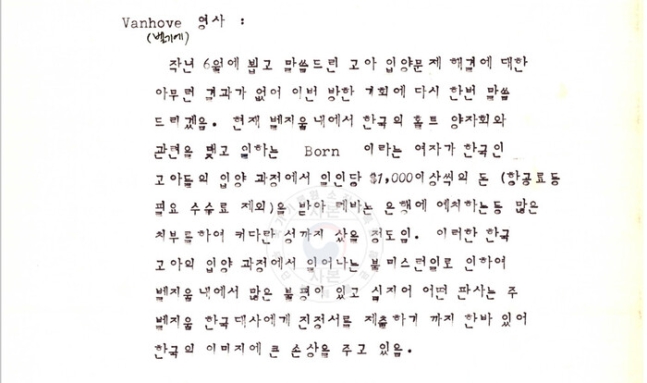Obtaining documents on international adoptions from 1974 to 1981.
Circumstances of the Korean government’s ‘connivance’ of illegal overseas adoptions.
Ministry of Foreign Affairs avoids responsibility for “private level issues”

On May 2, 1978, Belgian Consul Vanhove met with the Director of the Department for Women and Children of the Ministry of Health and Social Affairs of the Republic of Korea and reported that Korean children were being traded illegally. Data National Archives of Korea
The Truth and Reconciliation Committee is conducting a large-scale investigation to reveal allegations of illegal acts by adoption agencies and collusion and condonation by the Korean government during the international adoption of Korean children in the 1970s and 1990s. , a document containing a conversation in the 1970s in which a foreign government protested the Korean government's practice of accepting money from adoption agencies in exchange for adoption and urged improvement was confirmed.
At the time, the Korean government remained ignorant, calling it a 'private level problem', but this document is evaluated as showing that the Korean government's 'connivance' was behind the spread of illegal overseas adoption.
According to documents related to 'international adoption of orphans' written by the Ministry of Foreign Affairs from 1974 to 1981, obtained by the Hankyoreh from the National Archives on the 12th, the Belgian government at the time raised several issues surrounding the overseas adoption of Korean children, including the involvement of illegal brokers, but the Korean government turned a blind eye. Several circumstances are confirmed. The Belgian government became desperate and even requested a meeting with President Park Chung-hee.
“I advised the Korean ambassadors, but no action was taken.”
On May 1, 1978, Vanhove, the Belgian consul in Korea, met with the Director of the European Affairs Bureau of the Korean Ministry of Foreign Affairs and said, “A Lebanese-born woman named Born , who was working in connection with the Holt Children’s Welfare Association, was 1. “Korean orphans are being sold (to Belgium) for 800 to 1,200 dollars per person,” he said, adding that he would meet President Park Chung-hee and tell him this because the matter was urgent. Until the late 1970s, Belgium was the country with the largest number of Korean children adopted, following the United States, Sweden, Denmark, and Norway.

The Belgian government appears to have taken this seriously because if money is exchanged in exchange for adoption, it can be considered child trafficking. Consul Vanhover told the Director of the European Bureau, “I met with the Director of the Ministry of Health and Social Affairs last year and raised this issue, but I did not get any results. He strongly protested, saying, “I advised the Korean ambassador to Belgium to have the Korean government step in and stop (the broker’s intervention), but no action was taken.”
Suspicion of officials sharing adoption fees was also mentioned.
Adoption-related commissions were illegal under domestic law at the time. The Enforcement Decree of the Special Adoption Act, enacted in 1977, stipulates that 'an adoption agency may receive compensation for all or part of the costs incurred in adoption mediation from the prospective adoptive parents.' This means that only actual cost conservation is possible.
During the interview, Consul Vanhover also mentioned rumors in Belgium that high-ranking Korean government officials were sharing the adoption fee. There was pressure as to whether there was some kind of cartel between private companies and the government.
Director Koo Joo replied, “Please meet with the director of the Women’s and Children’s Bureau (Ministry of Health and Social Affairs), who is in charge, and talk about it.” However, on June 27, 1977, a year before this meeting, Consul Vanhover had already met with the Director of the Department for Women and Children of the Ministry of Health and Social Affairs and complained with a similar point. As no further action was taken, the case went to the Ministry of Foreign Affairs, not the Ministry of Health and Social Affairs, a year later, and was sent back to the Ministry of Health and Social Affairs.
The director of the Ministry of Health and Welfare’s Women’s and Children’s Bureau met with Consul Vanhover the next day and said, “The issue of orphan adoption is a private-level project. The Korean government is not involved. “If there are brokers taking commissions, that is a Belgian problem,” she replied.